2010 In Review: Charles' Take [Updated]
![2010 In Review: Charles' Take [Updated]](https://screenanarchy.com/assets_c/2012/09/Winters_Bone_1-thumb-430xauto-20352.jpg)
You might have noticed some of my illustrious, talented, and all-around terrific colleagues have set about ticking off their 2010 lists. Never one to miss a chance to throw out an unsolicited (although hopefully compelling) opinion, I thought I might weigh in. This isn't so much a best-of list, as much as a reflection on the last year and some of the films which stuck out for various, particular reasons for me.I think many of the other reviewers on the site have the same lament I've been carrying for the last couple of weeks: 2010 had so many movies and there was so little time to see them all. As of this writing, I still haven't had the opportunity to check out True Grit, Catfish, or give Black Swan the due diligence of a second viewing (if you held a gun to my head for an instant opinion, I'd say it was mostly excellent, though). Some films suffered from limited distribution, like the challenging Enter the Void or the much-lauded Dogtooth will, unfortunately, not get seen until they hit DVD/Blu ray earlier next year. For those of you interested, I'm sure there will be reviews of each forthcoming.
I should note that some of the entries here might, in fact, be foreign releases not yet available here in the U.S., and some may have been released in their home countries back in 2009. Well, I saw them in 2010, here in the states, so take that as you will.
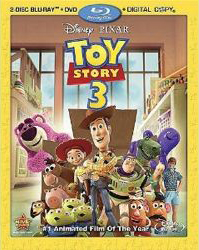 The "Heartbreaker of the Year" Award: Toy Story 3, Special Mention to Little Big Soldier
The "Heartbreaker of the Year" Award: Toy Story 3, Special Mention to Little Big Soldier
Pixar and the finest CIA interrogators share a similar job description: they're both tasked with knowing their targets and how to destroy them emotionally. How else do you explain the ruthless efficacy with which the mad geniuses at Pixar devastate audiences with each new entry in the Toy Story franchise? While other series reach their second sequel to diminishing returns, Lee Unkrich guides this nominal finale of the Buzz/Woody trilogy of stories perilously, frighteningly, and finally, tenderly home. That a movie about valuing toys stealthily invests as much of its mind space to ideas about selflessness and love and service to others is a testament to the skills of the studio what made it.
How then, to explain my pick of Little Big Soldier? Well, Jackie Chan, that's why. And I'm not talking about the eager-to-please, "if only he'd stop making kids films/when will he go away" Jackie Chan. Nor am I talking about the Jackie Chan tasked with "acting" (read: over-emoting) in dreck like New Police Story. Instead, Jackie plays a vulnerable, simple, peaceful hero in this Warring States-era film. He plays a character somewhat close to his own age, and he plays him without complication, without mugging (well, maybe a little), and he plays him so very compassionately in this anti-war/anti-nationalism parable. I fell in love with the actor all over again in this new elder statesman phase of his career. It's a heartbreaking performance made all the more achingly painful by a last-minute turn in the script during the film's final minutes that upends and threatens to ruin everything that came before.

The "Michael Cera Award for Excellence" Award: Youth In Revolt, Scott Pilgrim vs. The World
While I wasn't over the moon about the film adaptation of Bryan Lee O'Malley's series of comics, I wasn't immune to its charms either. A large part of that was thanks to the casting of Micheal Cera--you know, late of the backlash--as the title character. Between this and Youth In Revolt the immensely talented young comedian found interesting ways to tweak and tune the shy, passive-aggressive persona for which he is known. With Scott Pilgrim Cera channeled that essential George Michael-ness into a kind of response to prolonged shock and grief over a bad breakup. A synthesis of script and actor allowed the character to be something more than just the kind of flake who can't make up his mind: Cera's Scott was the walking wounded, masking hurt with flightiness, getting ever more brittle as the story progressed. Director Edgar Wright should be commended for guiding a performance to a place with actual heart in the midst of the manic comic and video game-inspired action. The one consolation that fans of the film and the book should have is that it seems to have been vindicated somewhat in its DVD/Blu ray release.
Youth In Revolt, however, impressed a bit more, if only for the gleeful anarchy of Michael Cera's role as the imaginary lothario, Francois Dillinger, a frequent smoker and sometimes criminal out to get his alter ego Nick Twisp (Cera, panicked) some hot and sweaty time with the girl of his dreams. The hormonally-charged journey of the lead propel him from adventures in junior arson and drug use, and it's hard to tell exactly how far Nick is willing to go to get the girl. I actually count Youth as one of the un-watched gems of the year.
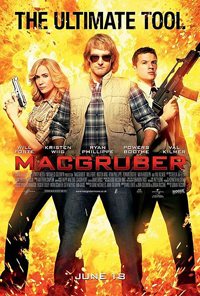
The "There's No Accounting for Taste" Award: MacGruber, Resident Evil: Afterlife 3D
I hope I wrote convincingly about why movies like these two--both crass, simple, and slight in their own ways--maintain their appeal to me and why I don't think they need (or really deserve) an extensive defense. I spent a few hundred words on the relative virtues of the latest in the Resident Evil franchise, but I didn't have the opportunity to talk about the mean-spirited pleasures of the SNL-spinoff, MacGruber. Solely existing to showcase the fearless, almost cringe-inducing willingness of lead Will Forte to earn a laugh, the movie is almost stolen out from under him by a nearly under-played performance by Val Kilmer as the title character's pony-tailed nemesis Deiter Von Cunth.
Yes, his last name is a not-too-subtle genital joke, and yes, I'm not above laughing at it every time Forte's MacGuyver knock-off hisses the name between grit teeth. The nearly constant misanthropy of the movie is a pleasure in and of itself, the good moments outweighing the bad, the mindlessness of it outweighed by an almost mercenary shamelessness that eschews trite pop culture references, sticking with a mostly effective send up of 90's Bruckheimer-ian action opuses.
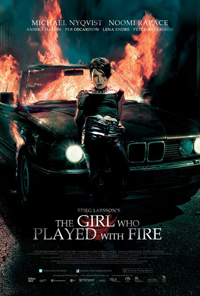
The "...But I Have My Limits" Award: The Girl Who Played With Fire
The second entry in the Millenium film trilogy succeeded in retroactively making me think less of the first film, a diverting airport novel-sized drama in film form. Fire was so astonishingly bad with its barely-there female lead, exasperatingly bland male lead, and offensively vague stabs at social relevance. It didn't help that the look of the film was severely downgraded after the admittedly effective visuals of the first movie. There's something so distressingly insistent about the movie: its supposed "edginess," (kickboxing Amazonian lesbians!) its brief and disastrous flirtation with social relevance (sex trafficking as the domain of evil white men) feel like the cinematic equivalent of waving one's arms desperately, hoping someone will pay attention.
I suppose my real problem is that the movie so very much wants to be something--a Red Riding for the Swedish--but in neither tone nor style does the movie reach the lofty heights of those investigative thrillers. I can forgive the vacuity of something like Resident Evil because it almost seems to exist for the sake of its own emptiness and disposability. Girl, is the movie with delusions or relevance, however, and it's trying to parse the layers of unexplored ideology and broad politics conceived by tehe film. Worse, Lisbeth Salander became one of the more exasperating characters of the year, conveying very little beyond hostility and emotional evasiveness. I'm sure readers of the novels will tell me that there are greater layers of depth and intensity there, but as a filmgoer, all I had to go on was role performed almost solely via eye makeup and long drags on cigarettes over a laptop screen.
Needless to say, I had no interest nor any intention of seeing the final film rounding out the misadventures of Lisbeth Salander, and I'm still struggling to understand what the appeal was for David Fincher when he agreed to direct the forthcoming remake of the first movie.
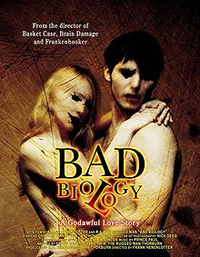
The "And I Also Saw The Human Centipede" Award: Bad Biology
As the title suggests, yes, I saw The Human Centipede and I also saw this putatively outsider's take on the generally outsider's genre of body horror. My feelings--ambivalence, really--towards The Human Centipede (The First Sequence) have been amply documented. But what of sometimes indie-est of indie horror filmmaker Frank (Basket Case, Frankenhooker) Henhenlotter's tale of a man whose mutant, drug-addled member is out of control and a woman whose vagina is wreaking havoc in her life? Well, I bring up Bad Biology in the same breath as The Human Centipede because both films come from the same thought space that declares that all you need to make a movie is, like, an idea. Unfortunately, in both cases, what's maybe compelling in a one sentence synopsis doesn't work out so well as a 90 minute experience on the screen.
The Mexican kidnap/incest drama Daniel y Ana has the Special Mention honor of joining these two films, milking about 90 minutes of ick--and later, boredome--from what could have truly been a complex drama about two characters profoundly affected by what was essentially a sexual assault upon them both.
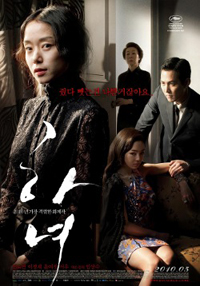
The "Excellence In Hothouse Thrillers" Award: The Housemaid
I'm going to crib from the first paragraph of my own review of this film, since I'm rather proud of it: "Sang-soo Im's The Housemaid could very easily have felt like it was made in the wrong decade. Typically, we don't get these kind of hothouse dramas on the screen, and indeed, Im had to reach back to the 1960 film of the same name for inspiration. But whereas that film was a sex-fueled thriller about a wild-eyed social climber, the 2010 remake is an incisive piece of social commentary about the widening disparity between the rich and the poor, the have's and the have-not's where everyone just happens to look fabulous."
I long for this kind of tightly-plotted, almost soap operatic (but somehow, still tightly-observed) melodrama from our own cinema here in the U.S.. We could do with more indulgent, destructive stories about sex and power, about control and abandon.
The "Disappointing In Wildly Different Ways" Award: Mother, TRON: Legacy
Both movies were a matter of expectations being met--one due to a combination of creative forces and material, and the other based on some snappily cut trailers and music by a duo who've been formative influences in my musical tastes. One film fell victim to a lack of focus and less of the refinement found in the brilliant director's other work, while the other film made up of parts and pieces of ideas, never really cohering into anything beyond a little flash, an admittedly kick-ass score, and an aesthetic that became less awe-inspiring and more tiresome than anything else.
Here's what I had to say about Mother a few months back (much to the consternation of some of our readers): "The masterfully-composed frames of Joon-ho Bong's latest always succeeds
in drawing the eye - but just as often this unconventional thriller
fails at drawing in the viewer's emotions. Centering on a mother's
attempts to protect her mentally challenged son after he's accused of
murder, superlative acting and direction can't redeem what feels like an
underwritten story."
Given the benefit of hindsight, I would like to retract that last statement about the story being underwritten. Reflecting on my viewing of the film, I'm more than willing to acknowledge that all of the pieces were there for a fine film--all of the elements were assembled, but it seldom felt of one piece. The wildly vacillating tone was, and remains my key problem with the film, embodied specifically by the broad, caricature-ish performance of Bin Won as the mentally disabled work.
Some readers complained that comparing this film Bong's brilliant Memories of Murder was out of bounds. For my part, I think it's quite the contrary: the director was working in a similar milieu, the names, places, and faces had change. What it lacked was the level gaze of that assured, incisive earlier film, resulting in a work that was a bit more style and sentiment than substance.
TRON: Legacy is, to my mind, the worst kind of bad film: its simple remit--guy goes into a compute to save his dad--was simple enough fuel for a movie, but it seems that even in this writers Edward Kitsis and Adam Horowitz failed to find one clear through line to follow and guide the rest of the movie. It's like that with so much of this sequel: flashes of ideas or something that might otherwise intrigue, instantly derailed by its own meandering, inanity, or simple lack of clarity. Seriously, can anyone out there explain to me what the story's ISO's were and what they could do? What about the basic rules of the world of the Grid? Why do programs need entertainment and death matches? For that matter, why do they need propagandist speeches?
The film is a true illustration of the difference between a mystery and something that's just utterly, blankly vague, a Rorschach test, a Mad Lib that allows you to fill in the blanks for what you think the movie means or intends when there is so very, very little actually going on (or even hinted at). Even the visuals--so compelling in a three minute clip--ultimately come up lacking, the empty blackness posing more of a problem than one would think for action scenes. All the negative space creates a sense of disorientation--not the good kind, mind you--making it hard to orient what's going on and how in the zipping and zooming couple of action scenes. It's not the worst film I saw this year, but it's certainly one of the most bereft of ideas.
The "It's Not Overrated if it's That Good" Award: The Social Network, Winter's Bone
If I were creating a numbered list for the year's best, these two would be at the top, jockeying for the number one spot. Which is better: the precisely-tuned, methodical, almost obsessive charting of modern social interactions, which both indicts and elevates genius as a deliberate, sometimes destructive, but always transformative force in the guise of young Mark Zuckerberg? Or what about the carefully crafted Ozark hell of Winter's Bone, a movie lauded as "authentic" in some quarters and derided just as readily as "patronizing" in others. I suspect both sides know about as much about life in the Ozarks, the people there, or their unique struggles, but I do know that director Debra Granik creates a plausible--even believable--setting for this stealth noir film set within the passingly lucrative but certainly deadly meth trade.
It would be well enough if both films traded in a sort of perfect cinematic veracity for their respective stories, but they're also elevated by lead performances that seem natural and unadorned by their young leads. Newcomer Jennifer Lawrence brings a level gaze and basic decency and courage to a character who could have easily been played for sainthood by a lesser actress. Meanwhile, Jesse Eisenberg's performance not only banishes the distaste the after limp performances in films like The Living Wake and Zombieland, channeling the coldness I've always detected (and been put off by) into something that ultimately gains--what, my sympathy, I guess--in his portrayal of Mr. Zuckerberg. That both performances are being mentioned for awards is not a surprise, and I would imagine no complaints from any quarter if both took home gold statues when Oscar time came around.







